Friday, September 6, 2024. Annette’s News Roundup.
Kamala is always busy
She arrived in Pittsburgh yesterday, greeted by Pennsylvania Senator John Fetterman.
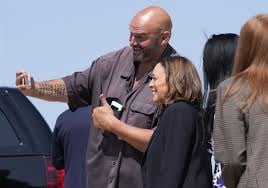
PITTSBURGH, Pa. (KDKA) -- Vice President Kamala Harris … [arrived] in Pittsburgh [yesterday] afternoon and is set to call the Steel City home for the next several days.
Today's visit for Harris comes just days after being in town for a Labor Day campaign event alongside President Biden. It was their first joint campaign event since Biden dropped out of the presidential race and Harris accepted the Democratic presidential nomination.
The vice president is expected to remain in Pittsburgh from [yesterday] through Tuesday, when she will travel to Philadelphia for a presidential debate with former President Donald Trump in Philadelphia.
Trump, the Republican nominee for president, has made numerous trips to Pennsylvania this year, including a rally last week in Johnstown and a town hall event with Fox News host Sean Hannity on Wednesday.
Democratic vice presidential nominee Tim Walz visited Pittsburgh on Wednesday, getting milkshakes with his daughter Hope, and checking out sunflowers at a Fayette County farm.
Vice President Harris will be back in western Pennsylvania again next week after the presidential debate. Harris and President Biden will pay their respects at the Flight 93 National Memorial in Shanksville, Pennsylvania, on Wednesday. (CBS News).
Want to know more about why Hunter Biden pleaded guilty yesterday?
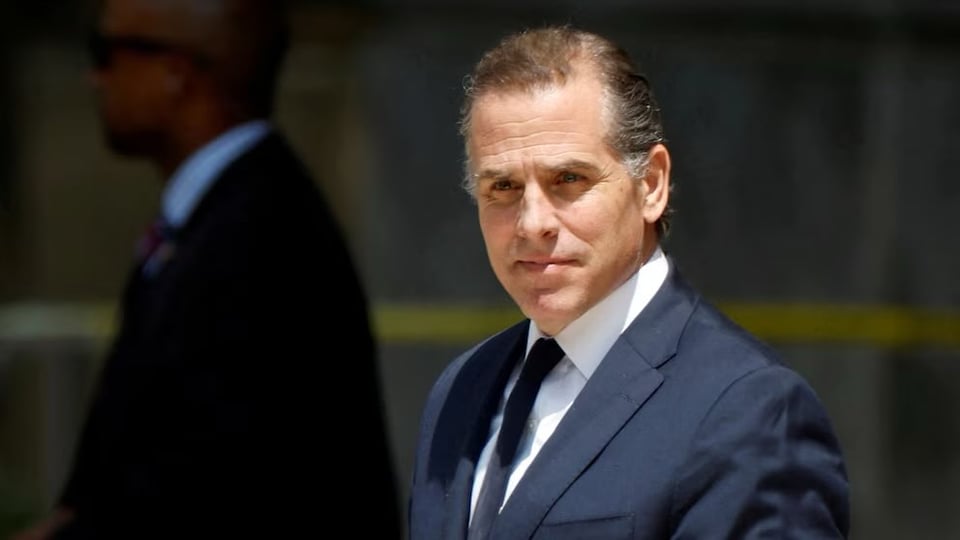
Read his statement.
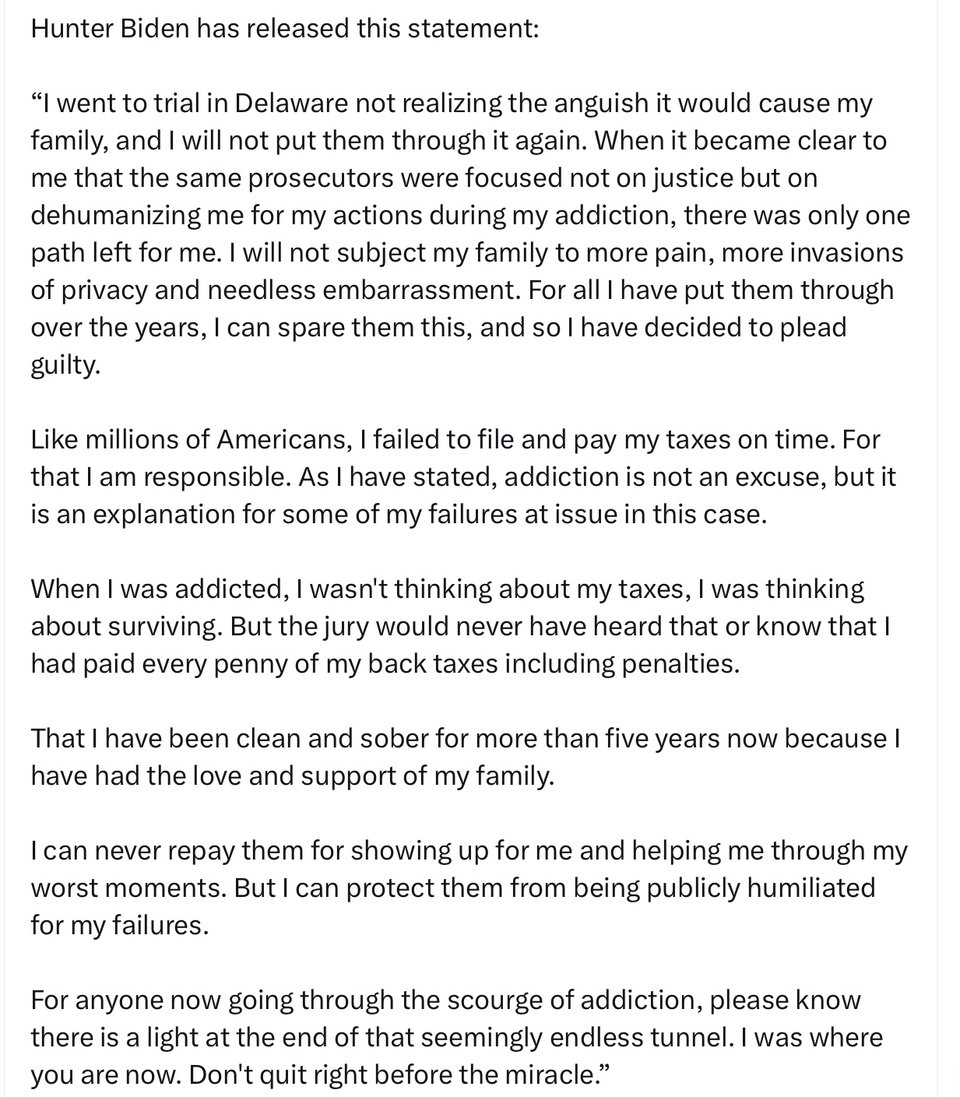
The Associated Press described Hunter Biden’s plea this way - Prosecutors were caught off guard when Hunter Biden’s lawyer told the judge Thursday morning that Hunter wanted to enter what’s known as an Alford plea, under which a defendant maintains their innocence but acknowledges prosecutors have enough evidence to secure a conviction.
Special counsel David Weiss’ team objected to such a plea, telling the judge that Hunter Biden “is not entitled to plead guilty on special terms that apply only to him.”
“Hunter Biden is not innocent. Hunter Biden is guilty,” prosecutor Leo Wise said.
After a break in the hearing, Hunter Biden’s lawyers said he had decided to plead guilty to all nine charges.
One more thing.
Here are the details of the plea entered by Hunter Biden and why.
What is an Alford plea? The Alford plea is named after a 1970 U.S. Supreme Court case involving Henry Alford of North Carolina, who pleaded guilty to second-degree murder to avoid the death penalty but still said he was innocent.
The Supreme Court said there was no constitutional violation.
The Justice Department says an Alford plea is when someone “maintains his or her innocence with respect to the charge to which he or she offers to plead guilty.”
“I want to make something crystal clear, and that is the United States opposes an Alford plea,” prosecutor Leo Wise said in court. “Hunter Biden is not innocent. Hunter Biden is guilty. He is not entitled to plead guilty on special terms that apply only to him.”
U.S. District Judge Mark Scarsi said he didn’t need the government’s approval. But after a break, Hunter Biden’s lawyers dropped the effort, and he pleaded guilty.(Associated Press).
More on Trump and Russia.
U.S. Charges American Commentator Who Works for Russian State TV.
Dimitri K. Simes, who was an adviser to Donald J. Trump’s first campaign, and his wife, Anastasia Simes, are accused of violating U.S. sanctions.
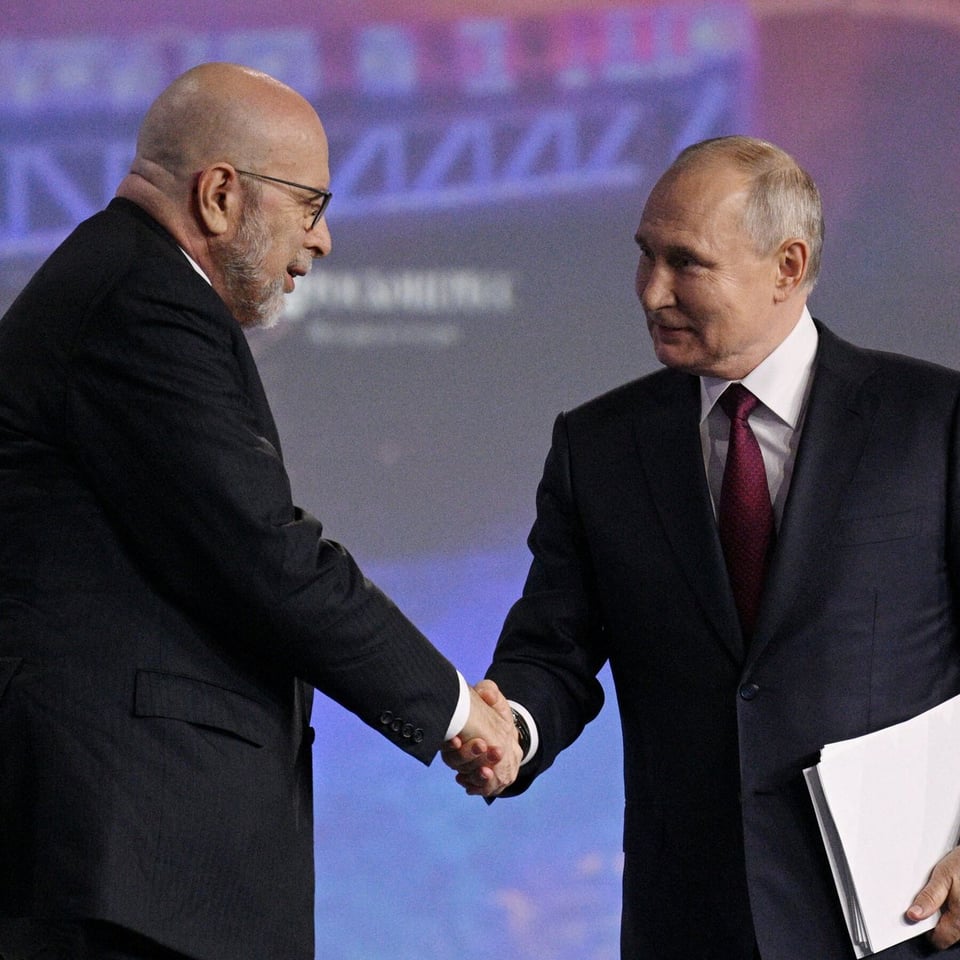
The Justice Department indicted an American commentator for Russian television on Thursday as part of a broader effort by the government to crack down on Russia’s attempts to influence American politics ahead of November’s presidential election.
Dimitri K. Simes, who was an adviser to Donald J. Trump’s first presidential campaign, and his wife, Anastasia Simes, were charged with violating economic sanctions against Russia for their work for Channel One, a state-owned television network.
The indictments come as the United States has been cracking down on Russian efforts to spread content from Russian broadcasters among American audiences, often by disguising its origins. Mr. Simes, who owns a home with his wife in Virginia but currently lives in Russia, has hosted a political talk show since 2022 on the network four nights a week on the network and another on Sundays.
Mr. Simes was an influential person in Washington for years, hosting frequent lunches at his think tank blocks from the White House. He would gather government officials, academics and journalists during the uneasy post-Cold War era. The topics often turned to issues of Russia’s relationship with the United States and NATO and Vladimir V. Putin’s ambitions to rebuild Russia.
His indictment comes a day after two employees of another Russian state broadcaster, RT, were indicted on a charge of spending nearly $10 million to have pro-Russia messages spread from a Tennessee company that created and publicized commentary from right-wing, pro-Trump influencers.
The Biden administration has been making a broad push against what it says is a concerted effort by Russia to influence the fall vote. American intelligence officials have said Russia’s president, Mr. Putin, considers November’s election critical because of Democratic support for Ukraine, which Russian troops invaded more than two years ago.
Documents released by the Justice Department show that as part of the effort, Mr. Putin’s office devised a plan to target swing state voters in favor of Mr. Trump and against further support for Ukraine.
The Justice Department charged both Simeses with violating the International Emergency Powers Act, the law that President Biden has used to impose an array of punitive sanctions against Russian officials and companies because of the war in Ukraine. Channel One, a state company that is among those under such sanctions, paid the couple more than $1 million, in addition to providing a car and driver and a stipend for an apartment in Moscow.
Ms. Simes, a jewelry designer, was also charged with money laundering and accused of helping a prominent Russian businessman, Aleksandr Y. Udodov, evade sanctions by purchasing art and antiques for him and keeping them in their home near Huntly, Va.
F.B.I. and other agents began searching the home on Aug. 13, seizing furniture and artwork over four days, Mr. Simes said in an interview on Wednesday before the charges were announced.
“They took a lot of the furniture,” he said. “They took practically all of the paintings and icons, which are where now — who knows?”
He added that the art pieces had long been in his possession.
“We got most of them before we moved to this house,” he said. “Most of them belonged to our parents. How could they be of any concern to the U.S. government?”
The indictment against Ms. Simes cited a number of artworks, including a 19th century painting by the German artist F.C. Welsch, “Lake of the Four Cantons,” and a bronze sculpture of Minerva by the French sculptor and painter Frédéric Auguste Bartholdi, who designed the Statue of Liberty.
Mr. Simes did not immediately respond to a request for comment after the indictment was announced on Thursday. In the interview earlier, he defended his work with Channel One Russia, even as he understood it would raise the ire of the administration.
“I assumed that what I was saying on Russian TV would not be to the liking of the Biden administration,” he said, “but I also assumed that as long as it was just my opinion and was presented as such, it was not something for which I could be prosecuted.”
Mr. Simes, 76, emigrated to the United States from the Soviet Union in 1973 and later became an adviser to President Richard M. Nixon. From 1994 to 2022, he served as the head of a think tank Mr. Nixon founded, now known as the Center for the National Interest.
The indictment against Ms. Simes cited a number of artworks, including a 19th century painting by the German artist F.C. Welsch, “Lake of the Four Cantons,” and a bronze sculpture of Minerva by the French sculptor and painter Frédéric Auguste Bartholdi, who designed the Statue of Liberty.
Mr. Simes did not immediately respond to a request for comment after the indictment was announced on Thursday. In the interview earlier, he defended his work with Channel One Russia, even as he understood it would raise the ire of the administration.
“I assumed that what I was saying on Russian TV would not be to the liking of the Biden administration,” he said, “but I also assumed that as long as it was just my opinion and was presented as such, it was not something for which I could be prosecuted.”
Mr. Simes, 76, emigrated to the United States from the Soviet Union in 1973 and later became an adviser to President Richard M. Nixon. From 1994 to 2022, he served as the head of a think tank Mr. Nixon founded, now known as the Center for the National Interest.
Mr. Simes said he believed that there was a high-level decision inside the Kremlin not to interfere in this year’s presidential race between Mr. Trump and, now, Vice President Kamala Harris.
“I can only tell you that I am absolutely convinced that there was no Russian interference unless you interpret as interference some low-key intelligence operation and some hackers,” he said. “And when I am saying that, it’s not like I am confirming that they were doing anything because I would not be in the position to know, but if there would be a major effort, I would know.” (New York Times).
Watch Trump say he will lift the sanctions on Russia. That was yesterday.👇
BREAKING: Donald Trump just announced if he wins, he will lift sanctions on Russia and Iran. This is why Putin was paying millions to Republican influencers. He’s bought control of Trump’s party. Retweet so all Americans see this alarming announcement. pic.twitter.com/iBfdKcUUd7
— Kamala’s Wins (@harris_wins) September 5, 2024
More on Trump, on economics… so to speak.
Watch Trump. 👇 and listen to the morons at the Economic Club of New York applaud him, after his incoherent word salad. Did they write checks too?
Donald Trump’s answer on how he will make childcare more affordable: pic.twitter.com/Hwu7R5aIt6
— Acyn (@Acyn) September 5, 2024
More on Trump and Arlington.
Justin Caporale. Named as one of the assaulters of the woman at Arlington Cemetery by NPR. Was also Jan 6 organizer. pic.twitter.com/aSQQI5nBHS
— BevMarie 🪷 (@evenbev) September 5, 2024
Trump deputy campaign manager identified in Arlington National Cemetery dustup.
One of two staffers involved in the altercation at Arlington National Cemetery is a deputy campaign manager for Donald Trump’s reelection bid, NPR has learned. The former president insisted this week the incident did not happen, highlighting a growing disconnect between the messaging of the candidate and his campaign. NPR is identifying both staffers after the campaign’s conflicting responses to the incident last week outside Section 60 of the cemetery, where many casualties of Iraq and Afghanistan are buried.
The two staffers, according to a source with knowledge of the incident, are deputy campaign manager Justin Caporale and Michel Picard, a member of Trump’s advance team.
JD Vance seems determined to be the most disliked vice Presidential candidate of all time.
Touch to watch. 👇
JD Vance says school shootings are a 'fact of life,' calls for better security https://t.co/8ylogAhBHF
— The Associated Press (@AP) September 6, 2024
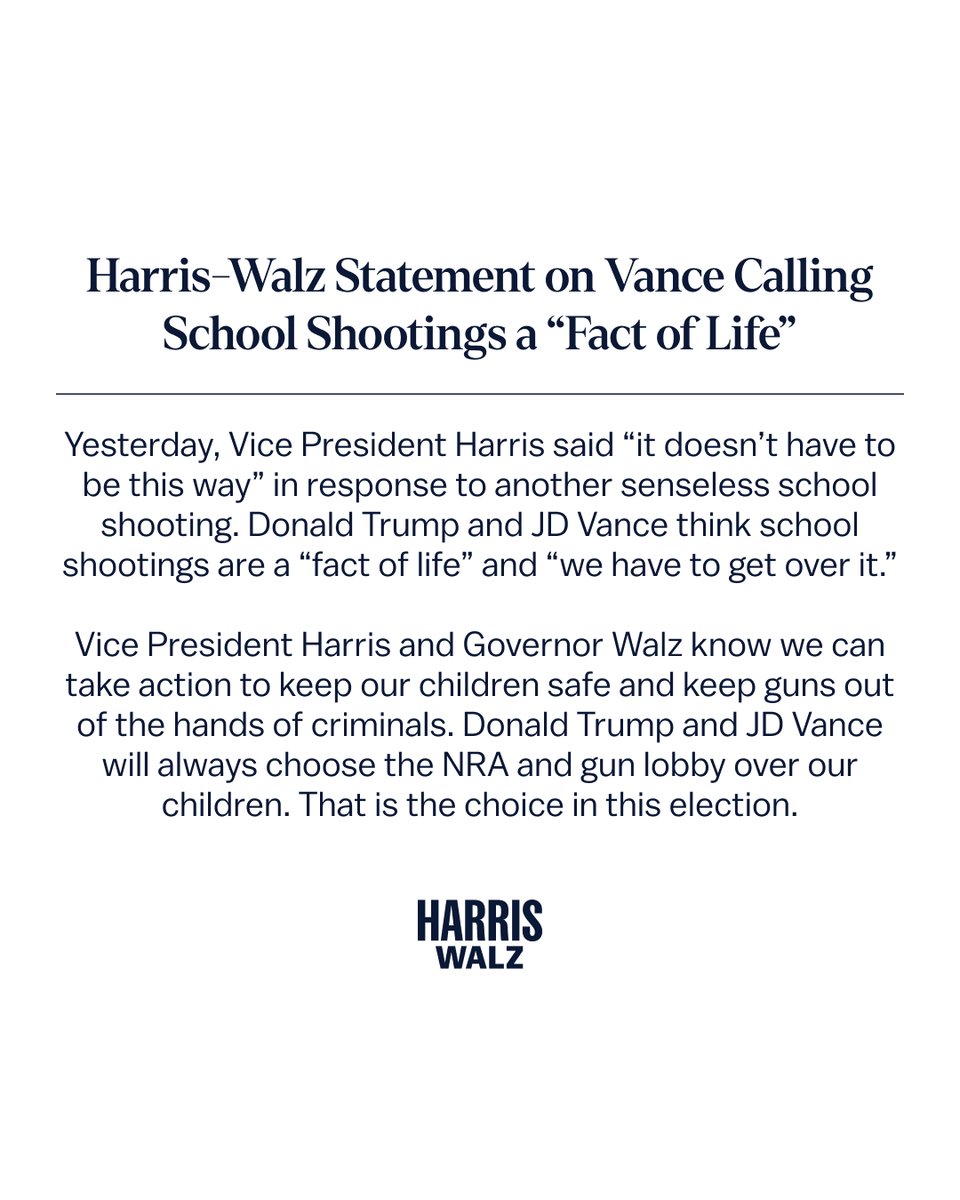
Endorsements.
So cool that NBA great, Olympic star, Steph Curry spoke up.
Touch to watch.👇
.@StephenCurry30: Endorsing Kamala Harris is important for me and my family. Knowing Kamala and having been around her, I understand she's qualified for this job. I think she's representing what it means to be a great leader and being a decent human being in terms of representing… pic.twitter.com/H9ANwYDS5x
— Kamala HQ (@KamalaHQ) September 5, 2024
Bill Kristol on Liz Cheney’s endorsemen.
Cheney’s Endorsement Was No Accident.
—William Kristol
A view from the #NeverTrump Right.
Liz Cheney spoke yesterday at Duke University, a very fine school known for being a five-time NCAA national men’s basketball champion. Like so many of those teams shaped by the great Coach K, Cheney came to play.
Honored by Duke as this year’s Sanford Distinguished Lecturer, Cheney engaged in a conversation with political scientist Peter Feaver on the subject of “Defending Democracy.”
As a former Republican leader in the House of Representatives and Vice Chair of the House’s January 6th Committee in 2022, Cheney had many important things to say on that broad topic. But what was notable is that she decided not simply to look back and reflect but to confront the challenge we face in defending our democracy now.
Speaking extemporaneously, Cheney said this to an auditorium full of students:
Donald Trump, no matter what your policy views are—no matter if you are a conservative Republican or not—Donald Trump cannot be trusted with power. The power of the presidency is the most awesome power of any office anywhere in the world, and the character of the people we elect really matters. And, so what I say is, I understand the desire to think that you’re casting a vote for conservative policies, but—first of all, he is not a conservative, and he’s dangerous, and this is not a policy election, and we can talk about getting this country back on track once we get through this election cycle—but Donald Trump, if he is reelected, will be far more dangerous than we have ever seen before.
He has told us he believes you can terminate the Constitution. He’s gone to war with the rule of law. He repeatedly suggests that the people who assaulted and attacked the Capitol should be celebrated. He has said he will ignore the rulings of the courts. He won’t leave office. He is a risk that we simply can’t take, and he has to be defeated.
I say that, not as a liberal Democrat. Not as someone who agrees with policies on the left most of the time, but he is simply a risk that, as a nation, we must never take again.
Because we are here in North Carolina, I think it is crucially important for people to recognize not only is what I’ve just said about the danger that Trump poses, something that should prevent people from voting for him, but I don’t believe that we have the luxury of writing in candidates’ names, particularly in swing states. And, as a conservative, as someone who believes in and cares about the Constitution, I have thought deeply about this, and because of the danger that Donald Trump poses, not only am I not voting for Donald Trump, but I will be voting for Kamala Harris.
And let me say that I think it is crucially important—and I would say especially to my fellow conservatives—that we think about the stakes and we think about the extent to which we have a duty, a duty, to put our country and our Constitution above partisanship. We all have that duty and responsibility.
That Cheney would endorse Kamala Harris in this year’s presidential election isn’t surprising. But most observers expected her to wait to do so until later in September.
But Cheney wasn’t being impulsive. She didn’t accidentally blurt out an endorsement whose debut had been planned for later. She knows that we are at a crucial moment in the campaign, after the Democratic convention and before next week’s debate. Harris has pulled even in the contest, but it’s on a razor’s edge. And some conservatives and Republicans—like former Pennsylvania Sen. Pat Toomey earlier this week—have had the decency to shun Trump but are nonetheless shying away from endorsing Harris.
Cheney thinks sitting out the contest is a fundamental mistake and an unwitting evasion of responsibility. She believes now is the time to step up and help other conservatives and Republicans understand why they need to get off the bench when there’s so much at stake. Cheney’s former January 6th Committee colleague, Adam Kinzinger, and the former lieutenant governor of Georgia, Geoff Duncan, made this case eloquently at the Democratic convention. Now Cheney has put an exclamation point on their arguments, and has laid the groundwork for two months of reiterating and reinforcing them. Which I gather she’ll be doing though an extensive schedule of travel and events through all the swing states.
Why did Cheney announce her support of Harris in a conversation in front of students, rather than from a podium at a national convention or in the calm and professional setting of a television studio? Maybe it was just a matter of timing and convenience. But she may also have thought it appropriate to say what she had to say in a context different from the normal venues politicians inhabit. She made the case against Trump and for Harris at a discussion about defending democracy. That’s not an accident. She was emphasizing that the 2024 election isn’t just politics as usual.
It also won’t have escaped Cheney’s notice that she was being honored by Duke as the Sanford Distinguished Lecturer. Terry Sanford was a longtime president of Duke University. (Not the least of his accomplishments was that he hired Coach K.) But before that, from 1961 to 1965, Sanford was governor of North Carolina.
On January 14, 1963, George Wallace was sworn in as governor of Alabama, proclaiming in his inaugural address, “segregation now, segregation tomorrow, segregation forever.” Four days later, on January 18, 1963, Gov. Sanford chose to give a major speech of his own, in which he became the first southern governor to call for an end to racially discriminatory employment practices: “The time has come for American citizens to give up this reluctance, to quit unfair discrimination, and to give the Negro a full chance to earn a decent living for his family and to contribute to higher standards for himself and all men.”
The path of Terry Sanford or that of George Wallace? We faced that choice sixty years ago, and as a nation we eventually chose the right path. Today one of our two major parties has nominated, for the third consecutive time, Donald Trump, the most dangerous demagogue to emerge in American politics since Wallace, but made more dangerous by his greater electoral success.
There haven’t been very many latter-day Terry Sanfords: elected officials from Trump’s own party with the courage and capacity to speak up against him and the threat he represents. All honor to Liz Cheney for doing so. (The Bulwark)
Should we take this as a Goldman Sachs endorsement?
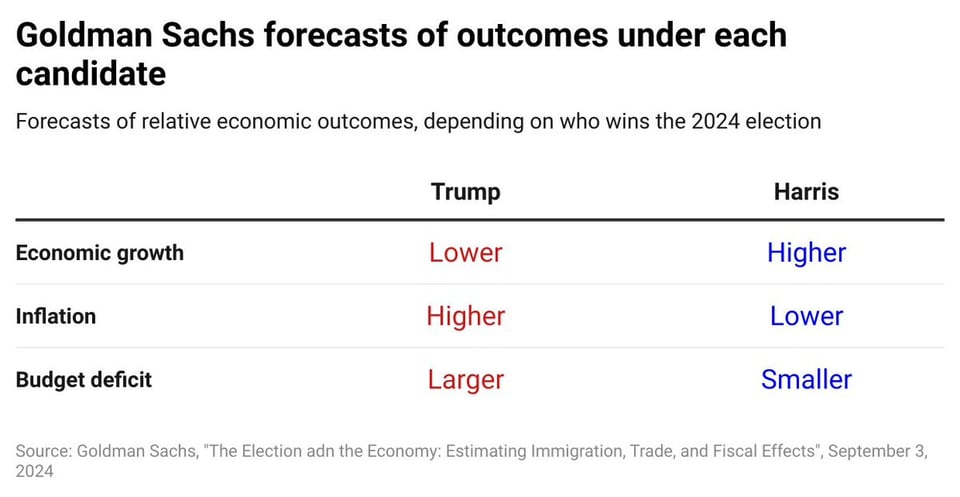
BREAKING: Goldman Sachs has predicted that under Kamala Harris, economic growth would be larger, inflation would be lower, and the budget deficit lower than under Donald Trump. This is a huge endorsement.
— Kamala’s Wins (@harris_wins) September 6, 2024
Joe is always busy.
White House secures release of 135 political prisoners in Nicaragua | Miami Herald
— Google “Project 2025” (@Sandra137198021) September 5, 2024
The Biden administration just keeps working on behalf of the American people!
Simply incredible! #JoeTheGOAT https://t.co/TvqoQxUbpk
Your daily reminder.
Trump is a convicted felon.
On May 30th, he was found guilty on 34 felony counts by the unanimous vote of 12 ordinary citizens.
The Convicted Felon Donald J. Trump was scheduled to be sentenced on July 11. He will now be sentenced sometime around September 18.
On another case against Defendant Trump, the magic date will be September 26.
Judge Chutkan to Trump’s lawyers today:
— Bob Geiger (@GeigerNews) September 5, 2024
“I understand there’s an election pending... the election is not relevant here. This court is not concerned with the electoral schedule.”
“I’m not talking about the presidency, I’m talking about a four-count indictment.”
Boom! pic.twitter.com/ffMEsoWAyP
Judge Sets Deadlines in Trump Election Case, Saying Campaign Is ‘Not Relevant.’
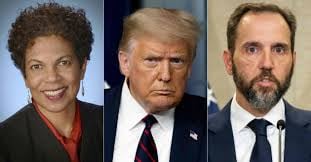
Judge Tanya S. Chutkan laid out a swift schedule for the election interference case against Donald J. Trump after lawyers on both sides shared how they believed the case should proceed.
A federal judge declared at a court hearing on Thursday that she would not let former President Donald J. Trump’s campaign for the White House affect the schedule of the criminal case in which he stands accused of plotting to overturn the 2020 election.
Hours later, the judge, Tanya S. Chutkan, fulfilled that vow by setting a schedule for the matter that moved speedily ahead and opened the possibility that prosecutors could make public more of the evidence they hope to use against Mr. Trump at trial in a court filing before Election Day.
Judge Chutkan established a series of deadlines for filings from both sides to assess the impact of several legal issues on the case, including the Supreme Court’s recent ruling granting Mr. Trump some immunity from criminal prosecution for official actions he took as president.
After an occasionally tense proceeding in Federal District Court in Washington, Judge Chutkan set a date of Sept. 26 for prosecutors in the office of the special counsel, Jack Smith, to submit an opening brief to her on the question of immunity. In that brief, prosecutors intend to set out the evidence they plan to use at trial and arguments for why none of that material — or any of the allegations in their newly revised indictment of Mr. Trump — is subject to the standards set for presidential immunity by the Supreme Court.
The brief is likely to include some evidence that goes beyond what was made public in the indictment, though portions of it could be redacted because of grand jury secrecy rules.
The hearing in Washington was held to discuss next steps in the case, which had been in limbo for nearly eight months as Mr. Trump pursued his claims to be immune from the election interference charges all the way to the Supreme Court.
The court ruled in his favor in July, granting him some immunity for charges arising from certain official acts as president. The justices also ordered Judge Chutkan to undertake the complicated task of sorting through a newly revised indictment and deciding which of its many allegations need to be tossed out under the immunity decision and which can survive and go to trial.
In her brief order, Judge Chutkan told Mr. Trump’s lawyers to respond to the government’s submission about immunity by Oct. 17. She also told them to finish making their arguments for why they need more discovery information from the government by Sept. 19.
The hearing — and Judge Chutkan’s order — showcased yet again how the defense and prosecution have been at loggerheads over the issue of timing nearly from the start of the case.
Thomas P. Windom, one of Mr. Smith’s deputies, opened the proceeding by suggesting a deadline of the end of September for the government’s arguments on why the entire revised indictment should be able to withstand the Supreme Court’s ruling.
Mr. Windom noted that the brief would likely contain new information, like F.B.I. interviews with witnesses, that would bolster the government’s contention that Mr. Trump was not acting in his official capacity when he sought to reverse his loss to Joseph R. Biden Jr., but was rather acting in his private role as a candidate for office.
John Lauro, a lawyer for Mr. Trump, argued that any debate about immunity should be pushed off until at least December, after the election, while the defense sought to attack the case on separate grounds.
When Judge Chutkan pushed Mr. Lauro on why he wanted to delay the discussions of immunity, he acknowledged he was concerned that some of the new information about Mr. Trump that the government wanted to include in its court papers could be made public at a “sensitive time,” in what seemed to be reference to the election.
That prompted Judge Chutkan to assert that the timing of the election was “not relevant” to the court proceeding.
“I am definitely not getting drawn into an election dispute,” she said.
Mr. Lauro also suggested during the hearing that Judge Chutkan should put off a factual debate about immunity and first consider some issues related to the subject on a purely legal basis. He pointed in particular to issues surrounding Mr. Trump’s pressuring of former Vice President Mike Pence to use his ceremonial role at the congressional proceeding to count Electoral College votes on Jan. 6, 2021, to disrupt the certification of Mr. Biden’s victory.
Mr. Lauro contended that Judge Chutkan should find that Mr. Trump’s conversations with Mr. Pence were subject to immunity and could not be part of a criminal case without illegally impinging on a president’s authority.
If so, he claimed, then the entire indictment should be thrown out because that would mean the grand jury had been improperly exposed to evidence about the two men’s dealings when it approved the charges.
Mr. Smith’s prosecutors contend that Mr. Trump’s discussions with Mr. Pence are not subject to immunity. But even if that assessment is wrong, Mr. Windom said, the indictment could still survive if a court decides all the other evidence the grand jury heard was by itself a sufficient basis for the charges.
Judge Chutkan’s order did not limit the special counsel to discussing only legal issues about Mr. Pence, leaving Mr. Smith free to submit the more fulsome factual filing that his team had proposed. Prosecutors had suggested making their arguments in a single brief so that there would be only one appellate fight over the matter.
Both sides and Judge Chutkan appeared to agree that however she ruled on the issues related to immunity, it would be appealed again to the Supreme Court — bringing more delays.
The hearing opened with a brief re-arraignment of Mr. Trump, who was not in the courtroom but in New York campaigning. Through Mr. Lauro, Mr. Trump pleaded not guilty to the revised indictment.
While the specific charges were the same as in the original indictment, some parts — particularly evidence about Mr. Trump’s attempts to strong-arm the Justice Department into backing his claims of election fraud — were removed. Other parts of the charges were tweaked to reframe them as examples of what prosecutors have called private “electioneering activity.”
Separately, Mr. Lauro said that he intended to file a motion claiming that the case should be thrown out because Mr. Smith had been improperly appointed as special counsel. Two months ago, Judge Aileen M. Cannon used the same legal argument to dismiss Mr. Trump’s other federal case — the one in which he stands accused in federal court in Florida of holding on to dozens of highly sensitive classified documents after he left office.
In her order, Judge Chutkan, an appointee of former President Barack Obama, set a deadline of Oct. 24 for Mr. Lauro to make a formal request to file the motion about Mr. Smith’s appointment.
But Judge Chutkan remarked during the hearing that she did not find Judge Cannon’s ruling “particularly persuasive” and pointed out that there was binding precedent that special prosecutors are in fact lawful from the federal appeals court that oversees her in Washington.
Mr. Lauro sought to defend his plans to challenge Mr. Smith’s appointment by arguing that Justice Clarence Thomas had questioned how Mr. Smith had gotten his job in a concurrence to the Supreme Court’s immunity ruling.
At one point, Mr. Lauro said that Justice Thomas had “directed” Mr. Trump’s legal team to pursue the motion. But he quickly amended himself, saying only that the justice had raised the issue in his concurrence.
Still, Judge Chutkan interrupted him before he made his correction, asking archly, “He directed you to do that?”
And sitting silently in the courtroom watching the proceedings, Mr. Smith seemed to share the judge’s reaction, nodding emphatically. (New York Times).